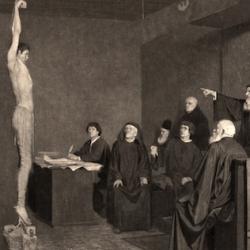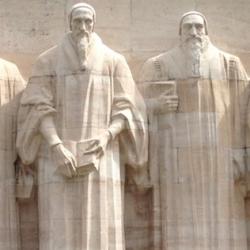“The most influential work of Italian spirituality in these years, the Beneficio di Cristo (published 1543, and apparently selling in tens of thousands before translation into other European languages), illustrates this continuing shapelessness—it was itself a somewhat shapeless work. It was written by a Cassinese Benedictine monk Don Benedetto da Mantova, through whom it gained a characteristically Cassinese colouring of the great Fathers of the fourth- and fifth-century Greek Church like John Chrysostom (chapter 2, p. 91). It was then revised by Benedetto’s friend Marcantonio Flaminio, a protégé of Valdés and Pole, to heighten its presentation of the spiritual and mystical themes of Valdesian theology, and it also silently incorporated substantial quotations from the 1539 edition of Calvin’s Institutes!
“The text emphasized justification by faith alone, and celebrated the benefits of suffering for the faith; yet Cardinal Morone loved it for its eloquence on the benefits of the Eucharist. The Inquisition’s opinion of it can be gauged by the fact that of all the thousands of copies printed in Italian, none was seen again from the sixteenth century down to a chance find in the University Library in Cambridge, England, in 1843. That disappearance, dismal proof of the Inquisition’s energy when it felt the need, is an eloquent symbol of the exclusion of the Spirituali from the future of the Catholic Church.”
(From Diarmaid MacCulloch, The Reformation: A History, 225, 227.)














